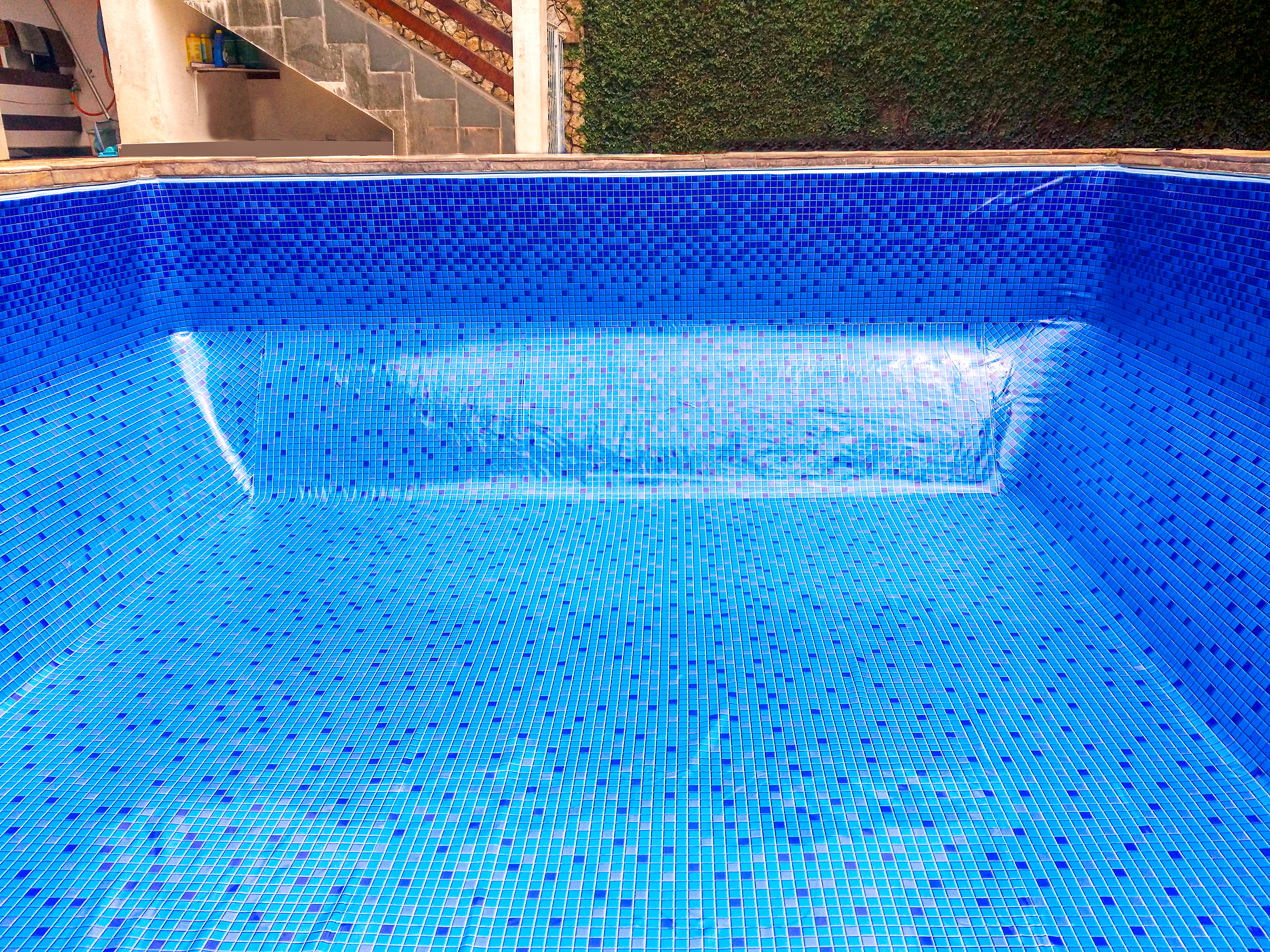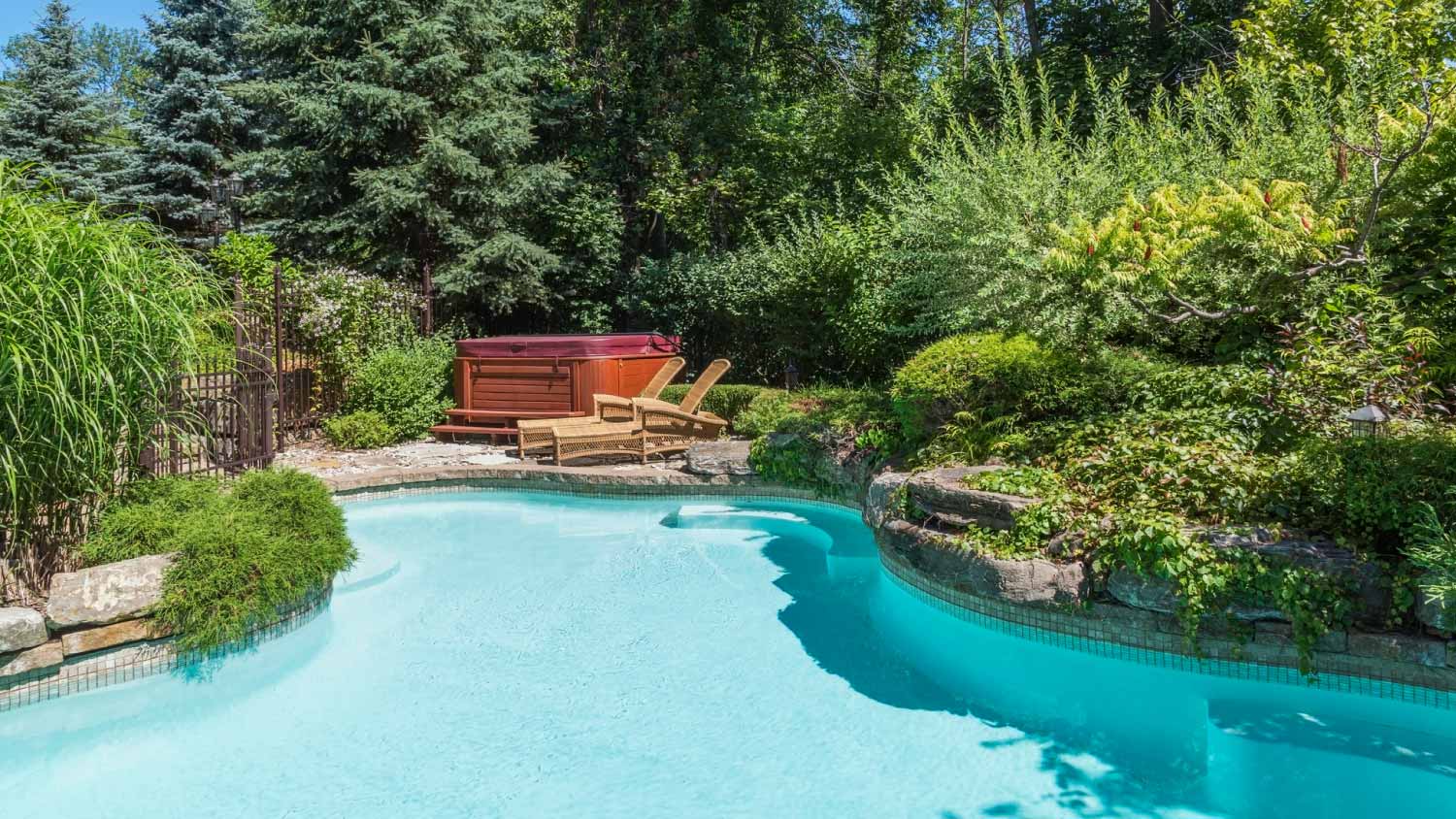
If you’ve been considering installing a new pool in the Buckeye State, this guide will help you understand inground pool costs in Columbus.
We’ve got you—and your pool—covered


Everybody loves a clean pool that sparkles with turquoise waters—but it takes a lot of work to keep it that way. Pool covers are an essential tool for homeowners who want to protect the cleanliness and temperature of their pools.
But which pool cover should you choose? There are several types of pool covers available, each with its own benefits and drawbacks. This guide breaks down the five types of pool covers: mesh, solid, automatic, solar, and water bag.
A pool cover is a large piece of material that stretches over your pool. Covering your pool provides a number of important benefits, including keeping debris out of the pool and minimizing the amount of solar heat the pool absorbs while also preventing heat loss from evaporation.
Pools carry the risk of slipping, falling, and possibly drowning. According to the (CDC), there are nearly 4,000 fatal unintentional drownings each year in the United States, and children ages one to four have the highest drowning rates (mostly in swimming pools). A thing as simple as a pool safety cover can prevent a tragedy like that from happening.
So which pool cover should you choose for your pool? There are five main types: mesh, solid, automatic, solar, and water bag covers.
Mesh pool covers stretch to fit any pool, while solid covers are rigid and tend to be custom-fit. Automatic covers unroll or retract at the touch of a button, making them the most expensive when it comes to pool cover costs. Solar pool covers offer budget-friendly solar protection, but not much safety. Water bag covers are secured with heavy bags of water around the pool perimeter.
Let's discuss each type in more detail and the benefits and drawbacks of each. When it’s time to call your swimming pool installer or local pool cover repair pro, you’ll have a better idea of which cover you’d like to use. Your pro can also offer their expertise as you make a decision.


Mesh pool covers stretch, making them an excellent option for fitting whatever shape of pool you have. They use anchors and attachments to hold them in place. Because they are mesh, they have tiny spaces that allow water in (preventing standing water from collecting on the pool cover) while keeping the sunlight out. Mesh pool covers cost between $1,200 and $3,000.
| Pros | Cons |
|---|---|
| Doesn't allow standing water to collect on the pool cover | Doesn't block all sunlight, so algae may grow |
| Lightweight fabric is easy to fold and store | Lets in dirty water from debris that falls on the cover |
| Stretches to fit many different pool shapes | Requires occasional pumping to prevent overflow |
| Easier to install |
Best for:
Those who live in sunny climates (since the mesh lets in sunlight)
Those looking for a safety cover that will prevent accidents
Those wanting a long-lasting option that requires little maintenance

Like mesh covers, solid pool covers can also be custom fit to your pool, but they are rigid in design so they often have to be built just for your pool if it’s not a common shape. They are heavier but still fairly easy to store by folding them up. Solid pool covers are great at keeping unwanted dirt and debris out, although standing water is occasionally an issue.
You can purchase a solid pool cover for $1,800 to $3,600.
| Pros | Cons |
|---|---|
| Blocks sunlight completely so algae growth is less of a problem | Made from vinyl, so they’re heavier than mesh |
| Blocks debris and dirty water completely | Standing water can collect on top of it |
| Still relatively easy to store | Not as flexible as mesh |
Best for:
Those with someone who can help them take the cover on and off due to the weight
Those with room in their budget for the added costs
Those who want a cleaner pool with less maintenance at the beginning of the season (because of the reduced algae growth)

Automatic pool covers come with the benefits of solid pool covers, but they’re retractable and fold on themselves, so you don't need to lug them around or put them in storage. You just press a button and voila, it rolls up or unfolds. While mesh and solid pool covers do a great job, they are a lot of work to roll out and then fold up again. You don't have to worry about any of that with this type of cover. However, automatic pool covers cost significantly more, at $7,000 to $25,000.
| Pros | Cons |
|---|---|
| Has all of the benefits of a solid pool cover | Has the same downsides as a solid pool cover |
| The easiest pool cover to use | Costs more than other pool covers |
| No need for storage |
Best for:
Those who need a pool cover that doesn’t require heavy lifting or prefer the convenience
Those with the room in their budget for the higher cost
Those looking for a cover that keeps in heat and reduces evaporation
Solar pool covers let in solar light to warm your pool for comfortable use even in cooler weather. In addition to blocking debris and evaporation, they act as solar blankets to keep pools heated. They are also the most affordable type of pool cover at $30 to $150. Despite their benefits, solar covers are very lightweight and cannot hold the weight of small pets or children.
| Pros | Cons |
|---|---|
| Conserve water by lowering water and chemical evaporation rates by 95% on average | Lightweight, loose fit provides no added safety for pets, children, or older adults |
| Let in solar light to effectively warm a pool up by 5–15 degrees Fahrenheit | Short life span of only 3 years |
| Allows you to swim comfortably on cooler days | |
| More affordable than other types of pool covers |
Best for:
Those who have other safety measures in place like a fence to childproof their pool
Those looking for a cost-effective option
Those seeking a way to help conserve energy
Water bag covers consist of a simple rectangular piece of solid or mesh material. They cover an entire pool area without cuts or alterations. Long tubes filled with water are placed around the cover’s edge to keep it in place, with excess material tucked under the bags.
Water bag covers only last one to three years and are simply a low-cost way to keep leaves and debris out of a pool while protecting it from the cold during the off-season. They cost $50 to $250.
| Pros | Cons |
|---|---|
| Heavy-duty material | Only last 1–3 years |
| Keeps leaves and debris out of the pool | Not as safe or effective as more expensive covers |
| Protects a pool from cold winter temperatures | |
| Budget-friendly |
Best for:
Those looking for a cost-effective option to keep pool water clean
Those living in cold climates
Those with other safety methods in place
AFS was excellent from start to finish. Jess, the sales associate, was fantastic...very knowledgeable and very professional. The installation crew was excellent. I couldn't be more pleased with the process. Best of all, my new floor looks fantastic!
Very easy to work with. The installers were very efficient.
I had a great experience with this company. They installed a small TV on the wall of my kitchen between two cabinets. Team came out and did a very thorough inspection and quote. The rep who installed the TV had to do some extra work to snake the cords behind the wall from the top cabinets...
These guys are the real deal! Their pricing was definitely competitive and fair; nothing really to write home about. But when it came to attitude and installation they knocked it out of the park. I had 3 estimates and while one was similar $$ to Eco's, the can-do and professionalism Steve...
The cost is for installing the toilet. I bought the actual toilet. I have not received the bill for the replacement of the faucet yet.
EXCELLENT TO WORK WITH, INSTALLERS WERE PROFESSIONAL AND CLEAN. ALL AREAS WERE COVERED WITH TARPS. A REAL PLEASURE TO WORK WITH.
From average costs to expert advice, get all the answers you need to get your job done.

If you’ve been considering installing a new pool in the Buckeye State, this guide will help you understand inground pool costs in Columbus.

The cost of pool liner replacement in Columbus depends on the size and shape of your pool, as well as the liner material and type. Here’s how the costs break down.

Don’t let broken pool lights keep you in the dark. Learn about pool light replacement costs, including unit prices, labor rates, and add-ons.

How much shock does my pool need? Here's how to calculate how much pool shock to add to your pool based on its overall water condition.

Hiring the right pro to build your pool is critical for a successful project. Find out what questions to ask pool builders to find the right match.

Swim from early spring through late fall and beyond by warming the water with a pool heater. Learn more about pool heater installation in this guide.